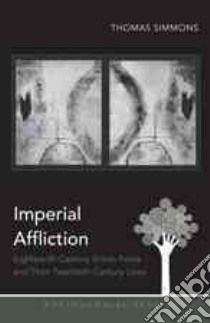Imperial Affliction - 9781433108723
Un libro in lingua di Thomas Simmons edito da Peter Lang Pub Inc, 2010
- € 70.20
- Il prezzo è variabile in funzione del cambio della valuta d’origine
Ana nacio en Oviedo. Espana. hace mas anos de los que le gustaria. pero menos de los que piensa la gente. Paso su infancia y gran parte de su juventud en Madrid. En 1989 se fue a vivir a Nueva York donde se caso, tuvo tres hijos (que de alguna manera que ella no acaba de comprender se hicieron adolescentes). y empezo su carrera como autora, editora y traductora de de libros. En las pocas ocasiones en las que no esta delante de su ordenador escribiendo, contestando e-mails, hablando o descargando fotos, se dedica a jugar y entrenar a un labrador para que se convierta un dia en un gran perro-guia de ciegos.
"In many ways," Robert J.C. Young writes, "colonization from the very first carried with it the seeds of its own destruction." Imperial Affliction examines some ways in which Young's observation could be applied to problems of subjectivity and influence within the colonizing nations themselves, particularly eighteenth-century Britain. How might these "seeds of destruction" manifest themselves as problems of identity? How might the very selves with greatest access to self-affirmation---the idea of the empire, the idea of British citizenry, the idea of the British self---actually find themselves vulnerable, confused, or damaged?
Using multiple forms of postcolonial critique, this book turns back to salient eighteenth-century British lives and work for a different kind of enlightenment. Among its central subjects are the elusive subjectivity of William Collins; the exilic religious experience of William Cowper and its multiple readings in the twentieth century by a self-fashioned exilic, Donald Davie; the "missed encounter" between Christopher Smart and Samuel Johnson, and the ways in which that problem was re-inscribed in the work of W. Jackson Bate and Lionel Trilling; the problem of imperial fixity in James Cook's journals with a view to Gray's "Elegy" and Gold-smith's "Deserted Village"; and the problem of purity as a paradoxically privileged and exilic force in the work of John Newton and Christopher Smart. In these explorations, this book illustrates both an expanded view of eighteenth-century colonial liabilities and a new emphasis on postcolonial critique as a means of exploring the fissures always present in imperial ambition.
Informazioni bibliografiche
- Titolo del Libro in lingua: Imperial Affliction
- Sottotitolo: Eighteenth-Century British Poets and Their Twentieth-Century Lives
- Lingua: English
- Autore: Thomas Simmons
- Editore: Peter Lang Pub Inc
- Collana: (Hardcover)
- Data di Pubblicazione: 15 Gennaio '10
- Genere: LITERARY COLLECTIONS
- Argomenti : English poetry 18th century History and criticism English poetry 18th century Appreciation Imperialism in literature
- Pagine: 182
- Dimensioni mm: 222 x 152 x 12
- ISBN-10: 1433108720
- EAN-13: 9781433108723


